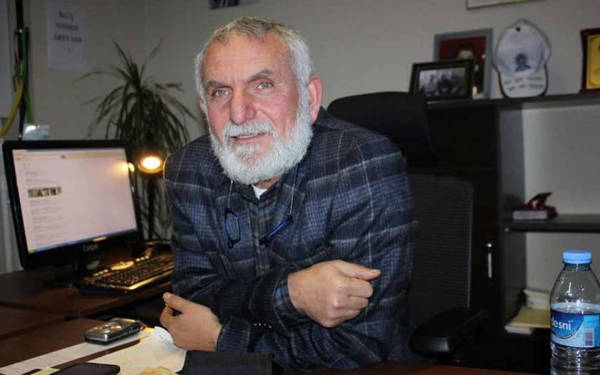Click to read the article in Turkish / Kurdish
After the 8th Penal Chamber of the Court of Cassation upheld the prison sentence of Özgür Boğatekin, the news director of Gerger Fırat local newspaper in Adıyaman, in June, he has received an official notification, summoning him to turn himself in for the execution of his prison sentence.
The journalist was sentenced to 1 year, 15 days in prison over the news reported on the newspaper in 2013. The news was about Ömer Bilgin, the then Sub-Governor of Gerger District, and Boğatekin has been penalized as per the Article 125 of the Turkish Penal Code (TCK) for criticizing him.
An investigation was also launched against Hacı Boğatekin, the editor-in-chief of the newspaper, over the same news reports. The prosecutor conducting the investigation decided to not prosecute further as the new stories in question were within the scope of freedom of expression.
In the notification delivered to Özgür Boğatekin, he is informed that "he is obligated to turn him himself in within 10 days, either to the Gerger Chief Public Prosecutor's Office or the Public Prosecutor's Office, within whose jurisdiction he lives." In the event that he fails to do so, Boğatekin will face "a warrant for detention and, when he is caught, he will be taken to an open penal institution by law enforcement."
'Our news were within the boundaries of criticism'
Speaking to bianet yesterday (August 20), Boğatakin said that he went to the Supervised Release Bureau yesterday, he would meet the prosecutor on Monday and it would be then clarified if he would be sent to prison.
Özgür Boğatekin reminded us that he was sentenced to prison over six news stories regarding the corruption in Gerger in 2013 and charged with insulting the then sub-governor. "Our news were within the boundaries of criticism," Boğatekin stressed further.
As indicated by the journalist, the news that they reported in 2013 were about how the social facilities built by the state in Gerger were left unattended. The reports of the Court of Accounts also proved the allegations.
Boğatekin briefly added the following:
"My father Hacı Boğatekin was investigated over the same news stories. Separate investigations were launched against me and my father due to the same news. I mean, I was interrogated by one prosecutor and my father was interrogated by a different one.
"A decision of non-prosecution was given for my father. I faced a lawsuit. When the trial ended, I was sentenced to prison. The Court of Cassation upheld my sentence 6 years later.
"In other words, I will serve time in prison because of the news that I reported almost 7 years ago. To top it all, the prosecutor that wrote my indictment is now arrested on Fethullahist Terrorist Organization (FETÖ)-related charges. I reported on corruption, I have been sentenced to prison.
'National press did not lay claim to us
"There is - in no way - any insult, but criticism in the news that were cited as insults to the sub-governor.
"Moreover, they were news supported by the reports of inspectors. They were news showing how the public money was spent for nothing. But as there is no freedom of press in Turkey, I will now enter prison.
"The pressure on the local press has increased more in recent years and the national press has not claimed us. But if we die, it will be their turn. Don't let them kill us or silence us. If we can stay alive, it will not be their turn."
Raising concerns over the recent surge in the novel coronavirus (COVID-19) cases in Adıyaman province, Boğatekin also noted that while the execution of sentences was deferred if they were given for judicial crimes, they wanted to send him to prison under such circumstances.
Önderoğlu: It has no place in contemporary democracy
Reporters Without Borders (RSF) Representative to Turkey Erol Önderoğlu has also criticized the imminent imprisonment of journalist Özgür Boğatekin. "Sending journalists to prison as convicts of insults has no place in societies which has made progress in contemporary democracy," Önderoğlu has protested. He has briefly added the following:
"In countries such as Turkey, which have quite a long record of denying basic freedoms and recently evolved into authoritarianism, arresting reporters for 'insulting the President' or 'insulting public officials' is a show of force because there is no tolerance for criticism or harsh words, they don't like it.
"The contemporary law says that 'even if there is swearing, it needs to be solved with the law of damages.' However, repeating the same mistake and despite our objections, the authorities allocated the Article 125 of the Turkish Penal Code (TCK) to the act of 'insult' in 2005.
"The relevant authorities have recently been releasing the convicts of insult on probation, rather than sending them to prison.
"Özgür Boğatekin will perhaps face a similar treatment. In that case, we neither tend to adopt the contemporary law nor stand behind our verdict of arrest. All methods of depriving people of their freedom due to their criticisms and opinions about the appointed and elected officials, including arrest and judicial control measures, need to be ended in Turkey."
Article 125 of the Turkish Penal Code (TCK)(1) Any person who acts with the intention to harm the honor, reputation or dignity of another person through concrete performance or giving impression of intent, is sentenced to imprisonment from three months to two years or imposed punitive fine. In order to punish the offense committed in absentia of the victim, the act should be committed in presence of least three persons. (2) The offender is subject to above stipulated punishment in case of commission of offense in writing or by use of audio or visual means directed to the aggrieved party. (3) In case of commission of offense with defamatory intent; a) Against a public officer, b) Due to disclosure, change or attempt to spread religious, social, philosophical belief, opinion and convictions and to obey the orders and restriction of the one's religion, c) By mentioning sacred values in view of the religion with which a person is connected, the minimum limit of punishment may not be less than one year. (4) The punishment is increased by one sixth in case of performance of defamation act openly; if the offense is committed through press and use of any one of publication organs, then the punishment is increased up to one third. (5) In case of defamation of public officers working as a committee to perform a duty, the offense is considered to have committed against the members forming the committee |
(HA/SD)





.jpg)

sa.jpg)






